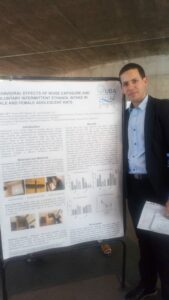Acid-sensing ion channels (ASICs) regulate synaptic activities and play important roles in neurodegenerative diseases as well as pain conditions.
Classically, ASICs are described as transiently activated by a reduced pH, followed by desensitization; the activation allows sodium influx, and in the case of ASIC1a-composed channels, also calcium to some degree.
The channel has been recently shown to be activated through a molecule present in the Texas coral snake venom. The finding was associated with the activation of the channel at neutral pH via the toxin and causing intense and unremitting pain.
By using different pharmacological tools, we analyzed the downstream signaling pathway triggered either by the proton and non- proton activation of ASIC1a-composed channels in in vitro models.
We show that the non-protonic mode of activation determines the activation of the ERK signaling cascade at a higher level and duration compared to the proton mode.
This study adds to the growing evidence of the important role ASIC1a channels play in different physiological and pathological conditions and also hints at a possible pathological mechanism for a sustained effect.

Menu
E-poster
Session: 7
PS7-13 | Different modes of ASIC1a activation and downstream signaling
Libia Catalia Salinas Castellanos
Instituto de Fisología, Biología Molecular y Neurociencia IFIBYNE
- CABA,
- Argentina
- Libia Catalina Salinas Castellanos1
- , Osvaldo Daniel Uchitel1
- , Carina Weissmann1
- 1. Instituto de Fisología, Biología Moelcular y Neurociencia
